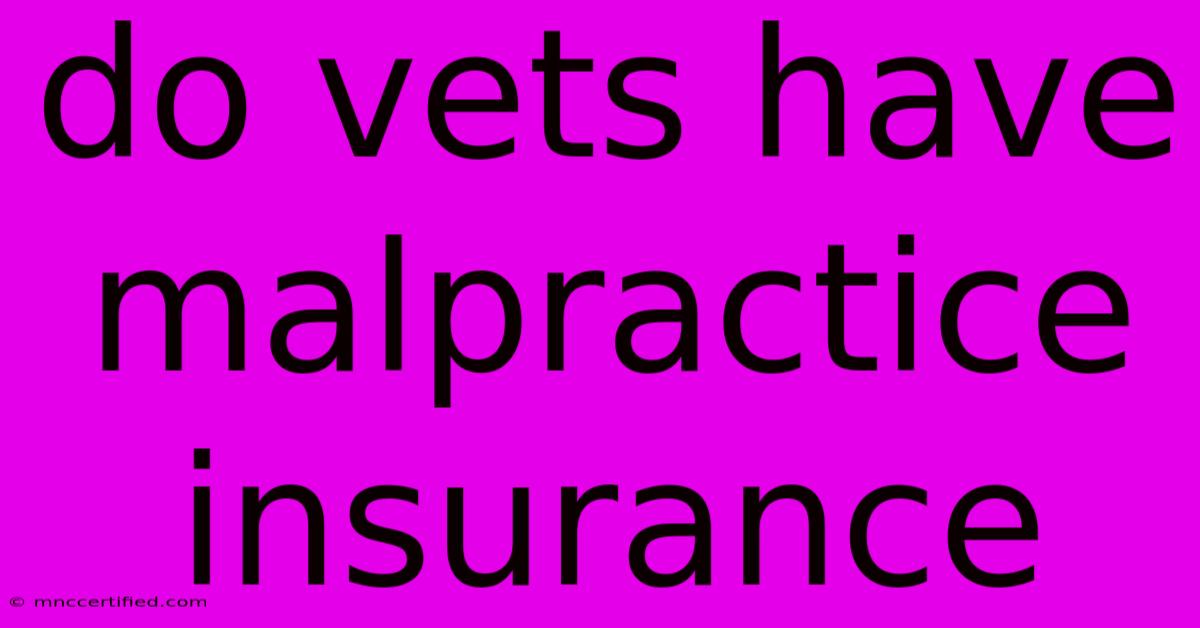Do Vets Have Malpractice Insurance

Table of Contents
Do Vets Have Malpractice Insurance? Understanding Veterinary Professional Liability
Veterinary medicine, like human medicine, involves complex procedures and significant responsibility. Mistakes, even unintentional ones, can have devastating consequences for animals and their owners. This raises a crucial question: do vets have malpractice insurance? The short answer is: yes, most veterinarians carry some form of professional liability insurance. However, the specifics can be quite nuanced.
The Importance of Veterinary Malpractice Insurance
Veterinary malpractice insurance, often called professional liability insurance, protects veterinarians and their practices from financial ruin resulting from claims of negligence or mistakes in their professional services. This coverage is essential for several reasons:
- Protecting against lawsuits: If a client alleges negligence leading to an animal's injury or death, a lawsuit could result in substantial legal fees and potential payouts for damages. Malpractice insurance covers these costs.
- Maintaining professional reputation: Even if a claim is unfounded, the legal process can be damaging to a veterinarian's reputation. Insurance helps mitigate reputational risks.
- Meeting licensing requirements: In some jurisdictions, carrying professional liability insurance may be a requirement for obtaining or maintaining a veterinary license. It's crucial to check your state's specific regulations.
- Peace of mind: Knowing you have adequate coverage allows veterinarians to focus on providing the best possible care for their patients without the constant worry of potential financial devastation.
Types of Veterinary Malpractice Insurance
Several types of veterinary malpractice insurance policies exist, each offering varying levels of coverage:
- Claims-made policies: These policies cover claims made during the policy period, regardless of when the alleged incident occurred. They often require "tail coverage" to protect against claims made after the policy expires.
- Occurrence policies: These policies cover incidents that occur during the policy period, even if the claim isn't filed until later. They generally offer broader protection.
- Tail coverage: As mentioned above, this is an extension of a claims-made policy, providing continued protection against claims arising from incidents that occurred while the original policy was in effect.
The specific type of policy a veterinarian chooses depends on factors like their practice size, specialty, and risk tolerance.
What Does Veterinary Malpractice Insurance Cover?
Typically, veterinary malpractice insurance covers:
- Legal defense costs: This includes attorney fees and court costs associated with defending against a malpractice claim.
- Settlement or judgment awards: If the veterinarian is found liable, the insurance covers the financial compensation awarded to the client.
- Medical expenses: In some cases, the policy may cover the costs of additional medical care for the animal if the claim is valid.
However, it's crucial to understand that policies may have exclusions, such as intentional acts or gross negligence. Reviewing the policy's specific terms and conditions is essential.
Finding Information about a Veterinarian's Insurance
While a veterinarian isn't obligated to disclose their insurance details to clients, you can inquire about their professional liability coverage. However, they're unlikely to share specific policy details due to privacy concerns. The existence of insurance is a strong indication of professional responsibility.
Choosing a Veterinarian: Insurance and Other Factors
While malpractice insurance is an important factor, it shouldn't be the sole determinant in choosing a veterinarian. Consider these additional factors:
- Experience and qualifications: Look for a veterinarian with relevant experience and certifications.
- Client reviews and testimonials: Online reviews can offer insights into the quality of care provided.
- Facility and equipment: A well-equipped clinic suggests a commitment to providing high-quality care.
- Communication and bedside manner: A veterinarian who communicates clearly and empathetically is essential for building trust.
In conclusion, while the specifics vary, most veterinarians carry malpractice insurance to protect themselves and their practices from the financial risks inherent in the profession. This insurance is a crucial aspect of responsible veterinary practice. Choosing a veterinarian involves considering multiple factors beyond insurance coverage, but the presence of professional liability insurance offers a degree of reassurance and reflects a commitment to responsible practice.

Thank you for visiting our website wich cover about Do Vets Have Malpractice Insurance. We hope the information provided has been useful to you. Feel free to contact us if you have any questions or need further assistance. See you next time and dont miss to bookmark.
Featured Posts
-
Portugal Star Eyes Retirement
Nov 17, 2024
-
Comedian Jon Kenny Dead At 66
Nov 17, 2024
-
Dentist In Memphis Tn No Insurance
Nov 17, 2024
-
Florida Lsu Final Betting Odds Week 12
Nov 17, 2024
-
Adding Trust As Additional Insured
Nov 17, 2024